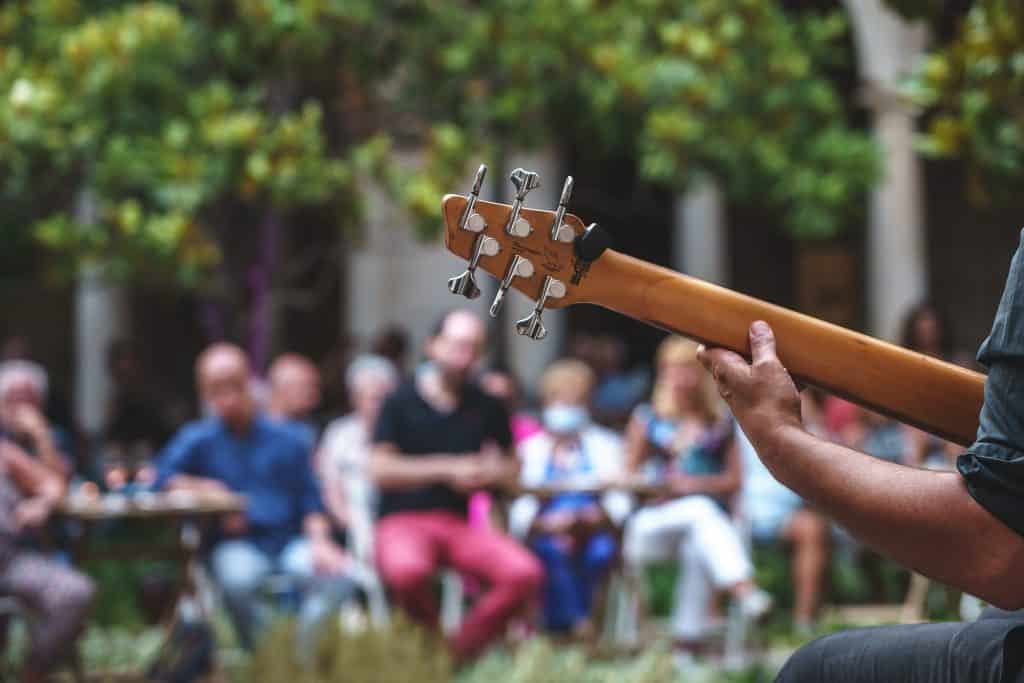Pause for a moment and recall the last or best concert experience you had?!…. Are you smiling? What makes live concerts so uniquely impactful? I bet most would answer the question by mentioning the “synergy” in that space. There is an unspoken collectiveness and connectedness that is undeniably present. The musicians, their music, the reaction of those around you, and the energy you put out, all come together to create a combined effect greater than the separate entities could produce alone, resulting in a moment that changes and charges you. Have you felt that? Do you miss it? When was the last time you experienced it? When life gets busy and we get tapped, extending ourselves to plan and go and give can be overwhelming, but with music in a collective space, there is so much to be received. We need it! Because we are humane.
So much has advanced in music therapy research and applied practice over the years, but the words of one of the field’s earlier philosophers still ring in my ear and truly ring home for me. E. Thayer Gaston’s principles and views of the “why” for music as part of our human nature in general, and as a mode of healing in music therapy, speak to the necessity of music in our lives, particularly when connecting with one another. “Music is the essence of humanness, not only because man creates it, but because he/she creates his/her relationship to it… it influences his/her behavior and condition” and “Music, by its very nature, draws people together for intimate, yet ordered function” (J Schmidt Peters, Music Therapy: An Introduction, 2nd edition, Charles C Thomas Publisher LTD, 2000).
Getting back to the present research, In 2020 , Dana Swarbuck published her research article “Collectively Classical: Connectedness, Awe, Feeling Moved, and Motion at a Live and Livestreamed Concert”, in which she studied audience response via surveys at live concerts and then transitioned to live streamed concerts in the midst of the pandemic. She concluded that, “These (physical/live) concerts seem to create the strongest bonds between people. Our studies also suggest that the physical concert experiences more often give us a feeling of absorption in the music, and the best musical experience.”
Thinking over the Covid pandemic period, when isolation was the order of the day. What did everyone do, all around the world? Musicians played from their balconies, professional musicians provided free concerts online and shared music over social media regularly, people connected via zoom to make and record music, and people listened and connected and felt less alone. Not to mention the messages of comfort, togetherness, and hope the music conveyed! We were reminded how much we needed each other, and music was what brought us the closest sense of intimacy when we were so far apart.
However, the recent pandemic and the readiness of recorded music through apps and online platforms can develop a sense of complacency for connecting with others in person. Also, the cost of a ticket, travel and lodging make seeking these experiences a challenge. But, inlight of Gaston’s insights and what we have learned about the importance of music as a catalyst in human connection, shouldn’t meeting together in music be considered a necessity, and shouldn’t one prioritize a concert attendance here and there to refuel and reconnect?
If you or someone you love experiences complications from autoimmune disease or a diagnosis that makes the noise of a concert, the closeness in proximity to others, or traversing a concert venue challenging, attending can be very difficult, despite the desire to go. The beauty of Summer in the midwest is that many barriers to attending a concert are removed! There are plenty of free concerts in the community, or performances at the price of a beer. When you hit up the local beer garden, concert in the park, or festival, there is access to music in an outdoor space where you can regulate how close you are to the sound system, to others, where you choose to sit, and you can also come and go as needed. So pull out your smartphone and use technology not as a replacement for the live concert experience, but to seek it out! See the links below for opportunities as a place to start!
